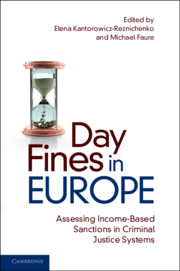Book contents
- Day Fines in Europe
- Day Fines in Europe
- Copyright page
- Contents
- Figures
- Tables
- Contributors
- Acknowledgements
- Abbreviations
- 1 Introduction
- 2 Theoretical Perspectives on Day Fines
- 3 Day Fines in Finland
- 4 Day Fines in Sweden
- 5 Day Fines in Denmark
- 6 Day Fines in Germany
- 7 Day Fines in Austria
- 8 Day Fines in Hungary
- 9 Day Fines in France
- 10 Day Fines in Portugal
- 11 Day (Unit) Fines in England and Wales
- 12 Day Fines in Slovenia
- 13 Day Fines in Spain
- 14 Day Fines in Poland
- 15 Day Fines in Croatia
- 16 Day Fines in Switzerland
- 17 Day Fines in Czech Republic
- 18 Day Fines in Romania
- 19 Comparative Law and Economics Perspective on Day Fines
- Index
- References
16 - Day Fines in Switzerland
Published online by Cambridge University Press: 11 June 2021
- Day Fines in Europe
- Day Fines in Europe
- Copyright page
- Contents
- Figures
- Tables
- Contributors
- Acknowledgements
- Abbreviations
- 1 Introduction
- 2 Theoretical Perspectives on Day Fines
- 3 Day Fines in Finland
- 4 Day Fines in Sweden
- 5 Day Fines in Denmark
- 6 Day Fines in Germany
- 7 Day Fines in Austria
- 8 Day Fines in Hungary
- 9 Day Fines in France
- 10 Day Fines in Portugal
- 11 Day (Unit) Fines in England and Wales
- 12 Day Fines in Slovenia
- 13 Day Fines in Spain
- 14 Day Fines in Poland
- 15 Day Fines in Croatia
- 16 Day Fines in Switzerland
- 17 Day Fines in Czech Republic
- 18 Day Fines in Romania
- 19 Comparative Law and Economics Perspective on Day Fines
- Index
- References
Summary
In 2007, a new Swiss Criminal Code became legally effective in which short prison sentences were to a large extent replaced by income-based day-fines. In addition, flat fines (fixed sums ranging from 1 to 10,000 Swiss francs) became more widely available as additional sanctions. Both fines and day-fines are to be converted into custody if they remain unpaid. Several thousand defendants are affected by such a conversion every year, but no systematic information has been collected on these cases. In order to fill this gap, the Department of Justice of the Canton of Zurich commissioned an evaluation on how often, under what circumstances and against what type of defendants monetary penalties are converted into custody. To this end, 447 case files were analyzed and a sample of 106 defendants serving a monetary sanction in prison were interviewed. Staff members and officials in charge of collecting monetary penalties were also interviewed. The results show that the most defendants serving monetary penalties in prison are confronted with multiple problems of integration. A second group were sentenced to substantial amounts of flat fines or day-fines that they or their networks were unable to pay.
Keywords
- Type
- Chapter
- Information
- Day Fines in EuropeAssessing Income-Based Sanctions in Criminal Justice Systems, pp. 306 - 323Publisher: Cambridge University PressPrint publication year: 2021

